In which the beleaguered reviewer attempts to make some headway into the mounds of CDs seeking reviews accumulating daily by providing quick hits on a few recordings at a time.
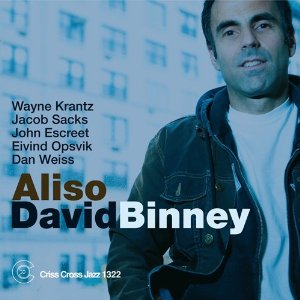 David Binney - "Aliso"
David Binney - "Aliso"
(Criss Cross Jazz)
Alto saxophonist David Binney is one of the most important artists in jazz today. His work as a player and composer as well as as a mentor/producer for so many great young musicians is exemplary and he is, in my opinion, the finest alto soloist working the genre. In fact, we gave Binney our 2009 Artist of Year, as well as, best solo of year (see here). His last recording was Third Occasion - one of our 2009 top-ten recordings (see our review here) - where the artist challenged himself by writing for a brass section. That album was serious stuff, so it is a different kind of pleasure to hear Binney just cut loose for some fun on his new recording - Aliso. Joined by some of his usual crew: bassist Eivind Opsvik, pianist Jacob Sacks, drummer Dan Weiss and guitarist Wayne Krantz (along with young pianist John Escreet on two tracks) - Binney leads this combo through four interesting new originals, as well as five tracks written by the masters. The project came together without any previous rehearsals, but these musicians don't seem to mind, as they rip through these tunes with an abundance of joyful energy and obvious pleasure of playing together. These aren't some of Binney's more complex pieces, but that doesn't prevent the album from being a ton of fun, with excellent playing and superb communication amongst the band members. Meanwhile, Binney's choices of covers gives us an insight into his influences: two Wayne Shorter tunes, one from Thelonious Monk, one from Coltrane and Sam Rivers' "Fuchsia Swing Song."
Binney's love of rock music comes through on the sunny and rhythmic opening title track - named for the California street he grew up on. Weiss - known for his tabla-inspired playing with Rudresh Mahanthappa, shines, and Krantz shreds on fusion-esque electric guitar. Binney's solos aren't just supersonic streams of notes - there is thought and care behind all he does - and he does it all so effortlessly that one can be fooled by the amount of work it has take to acquire such a level of technique. The hurky-jerky "A Day in Music" is another brilliantly twisted and quite refreshing composition with great solos from Binny and Krantz and excellent ensemble work from Sacks, Opsvik and Weiss. "Strata" is a wonderful jumping piece with the bass part doubled by the piano and a feel like a wide open road. Weiss percolates and Krantz adds delicious electronic effects underneath Binney's ferocious solo that leads into an intriguingly angular solo by Sacks. The final original is a dark and subtle composition called "Bar Life" and speaks of Binney's many years playing bars and especially the 55 Bar. It is also an outstanding number - featuring some of Escreet's devilishly off-kilter piano excursions and some nasty screaming guitar - and just may be my favorite of the new pieces.
Meanwhile, the covers of Wayne Shorter's "Toy Tune" and "Teru" speak to the respect Binney has for the great saxophonist. Sacks shows an original touch on his solo on the former, while Opsvik is showcased nicely on the latter. In both cases, Binney is reverential, even while stretching the borders. On "Fuchsia Swing Song," fans may be surprised to hear the visionary take the straight road, but golly it sure is fun - with Weiss taking a solo spotlight. "Think of One" has seemed to pop up quite a bit lately, but this version is one of the most the enjoyable I've heard. But it is the finale - a small combo version of Trane's "Africa" that truly takes this recording into a higher stratosphere. Always one of my favorite Coltrane works, Binney and his band not only do justice to this great song, but bring it into the new millennium. Hearing Coltrane-inspired sheets of sound on Binney's alto is a treat, and the band is simply on fire - especially Escreet and Krantz. Not his most groundbreaking work, but this new release is highly satisfying and may be the perfect introduction to those unfamiliar with the man who is the truest and most important direct descendant of Trane, Monk and Shorter - David Binney.
www.davidbinney.com
Jean Michel Pilc - "True Story"
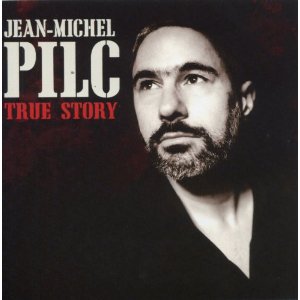 (FDM)
(FDM)
French-born, NYC-based pianist/composer Jean-Michel Pilc is a serious deep thinker who has incredible technique and the creativity to merge classical, traditional and modern jazz and other elements into a highly-singular style. Veteran drummer Billy Hart and Mingus Big Band bassist Boris Kozlov join the eclectic pianist on a program of mostly originals. Franz Schubert, Cole Porter and Tom Jones are covered as well ("Relic," "My Heart Belongs to Daddy" and an almost unrecognizable "Try to Remember"). Pilc gets vicious on tracks like "PBH Factor" and "High Sky - The Elegant Universe," the Monk-ish "B.B.B." and sinister "True Story - Scene 1" while showing a tender side on pieces like "A Brief History of Time" and "Mornings with Franz." Initially, the recording seemed a bit too clinical for my taste, but I have warmed to it much more upon repeated listenings. At first it seemed more a solo piano outing, but Kozlov and Hart's input is tasteful and delicious when you focus on it. And Pilc's compositions reveal subtleties and glowing beauty as you peel the layers back. Pilc's creativity is at times almost unfathomable, and there are even surprises like"Kingston, NY," which swings in such a lovely manner that it makes you wish the pianist would do more in that vein. And the album reaches it heights when the band is going full-tilt (as on "Try to Remember"). Somewhat reminiscent of Bill Evans' work, but Pilc has his own original take on the piano that has given him a reputation as a brilliant innovator. Pilc is also the subject of a recent documentary - in which he expounds on his artistic theories - which we hope to review shortly.
www.jmpilc.com
 Ryan Keberle - "Heavy Dreaming"
Ryan Keberle - "Heavy Dreaming"
(Alternate Side Records)
Ryan Keberle has earned his reputation as one of the best young trombonists/composers/bandleaders over the past few years. His new Double Quartet recording, Heavy Dreaming builds upon the promise of his first release - Double Quartet (see our review here) - taking Keberle's vision to another level. Keberle is a member of both Maria Schneider's Orchestra and Darcy James Argue's Secret Society and he has a similar attraction for the colors and textures created by a large ensemble. However, Keberle takes things in his own direction by excluding saxophones - instead utilizing two trombones (the excellent Marshall Gilkes joins Keberle), trumpet (Mike Rodriguez), French horn (John Clark) and tuba (Marcus Rojas - from Dave Douglas' Brass Ecstasy) along with a rhythm section of bassist Matt Brewer, drummer Eric Doob and fellow Schneider Orchestra alum pianist Frank Kimbrough. This unique ensemble of talented musicians is highly qualified to produce Keberle's luminous music, and although I am saxophone fanatic, I am enthralled by the arm, rich sounds created by this group.
The opening number "If You Want" starts things off beautifully with great brass harmonies, an excellent trombone solo and effervescent work from Kimbrough and Doob. "One Thought at a Time" is a jaunty stroll with some great off-kilter bass by Brewer. The two-part "Heavy Dreaming" is utterly breathtaking and a true highlight with adventurous directions and memorable ensemble work. The gospel-drenched Duke Ellington composition "I Like the Sunrise" is a delight, as is the angular Brewer-driven "the Slope of the Blues," and the shimmering and stately "Early Morning" would please the Duke. Keberle writes for trombone - giving the instrument a central position (most of the solos belong to the bone), but it isn't a gimmick - he has placed this often unwieldy horn in the spotlight where it can sing. Gershwin's lovely "Our Love is Here to Stay" is given a loving treatment, while the original "Coolant" is a welcome burst of toughness in a mostly lush presentation. Keberle covered the Beatles as well on his first album, and he ends here with an exceptional arrangement of "Mother Nature's Son." I can't say enough about this release - one of the finest so far of 2010 - but to exhort you to pick up a copy.
www.ryankeberle.com
Ralph Towner Paolo Fresu - "Chiaroscuro"
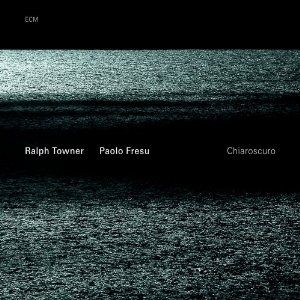 (ECM)
(ECM)
Guitarist Ralph Towner - now 70 and living in Rome - has been entertaining people for decades - beginning in the 1960s with the groundbreaking Paul Winter Consort, the 1970s with his group Oregon (with whom he still tours) as well as solo recordings and duet recordings with people like Gary Burton and Gary Peacock. Here he teams up with Sardinian trumpeter Paolo Fresu - who was recruited by Carla Bley for her well-received 2007 album The Lost Chords find Paolo Fresu - and it is a good match. Mixing a soundtrack of new and revisited Towner pieces with improvisations and a cover of Miles' "Blue in Green," the duo show a nice affinity for one another in this well-balanced effort from ECM. Towner primarily plays classical nylon-string in a pleasant and somewhat sad manner, but also adds baritone guitar and the 12-string guitar for which he first came to fame. Fresu has a Miles-like sound and adds some tasty flugelhorn to the mix. Great atmospheric music for reading, relaxing or meditation.
http://www.ecmrecords.com
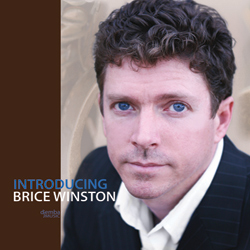 Brice Winston - "Introducing"
Brice Winston - "Introducing"
(Djemba Music)
If you haven't yet heard saxophonist Brice Winston, his debut recording as a leader - the aptly titled Introducing - will be a welcome "introduction" to an outstanding artist deserving of wider acclaim. A former New Orleans native (now located in Tucson, AZ), Winston may be best known as a member of trumpeter Terence Blanchard's group - appearing on Blanchard's Grammy Award-winning A Tale of God's Will. Winston here is joined by three other stellar Blanchard band alum, including pianist Aaron Parks, bassist Derrick Hodge and drummer Kendrick Scott. All of these players are monsters on their instruments, and their familiarity with each others is an added strength. Besides being a player with impressive technique, Winston proves himself to be a first-rate composer. All nine pieces are originals in a Michael Brecker-meets-Blanchard/Branford Marsalis vein of melodic, yet serious and edgy compositional style.
"Time to Spare" opens up with Hodge and Winston in unison - over Scott's percussive "Tain" Watts-meets-Brian Blade drumming - and soon joined by Parks on a hypnotic and kinetic post bop groover. "Dare to Dream" meanwhile is an absolutely exhilarating wild ride with superb work by Hodge and Scott creating a powerful rhythm force underneath for Winston and Parks to soar over - a sheer highlight of adventurous and highly masterful improvisation. Winston switches over from tenor to soprano for the balladic "Step by Step." Hodge treats his electric bass like a mbira - producing an chiming Afrobop feel on "Half Sight" - which includes stellar solos from Winston on soprano and Parks on piano. Again, Scott shows why Blanchard calls him the "most melodic drummer" he has ever played with - he produces a vast array of sounds from his kit (his solo here is amazing), while maintaining the importance of the beat. After the intensity of "Half Sight," the mid-tempo pacing of "Many Faces" is a welcome respite and includes some of the most delicious of Winston's tenor solo forays. The African-tinged "In Time of Need" continues to slow the pace a bit - with great percussion by Scott - as does the luscious "Aftermath." A funky/blusey "Recalled to Life" is followed by an alternate - and equally rewarding - version of "Time to Spare" to end this satisfying and well-recorded album. A wonderful debut from a talented player and composer (as well as educator) - and one of the best albums I've heard this year - do yourself a favor and introduce yourself to this fine player.
www.bricewinston.com
The Vinson Valega Group - "Biophilia"
(Consilience Productions)
NYC-based drummer Valega is a leader of an artist-based Web site called "Consilience Productions" - named after William Whewell and socio-biologist Edmund O. Wilson's term - "consilience" - meaning "unity of knowledge." This wouldn't be relevant except that the music that Valega and his band members have composed for this release seems to follow that philosophy so well musically in that traditional jazz styles are merged with modern songwriting to create an engaging new whole. Original works are joined by numbers from Duke Ellington, Irving Berlin, Thelonous Monk and Ornette Coleman. So for example - the album starts off with talented keyboardist Matthew Fries' jumpy "I Knew You'd Say That" and then moves into a loving version of Ellington's "Sunset and the Mockingbird" before moving into a free jazz intro to Velega's "A Moment of Silence." This dichotomy of old and new "knowledge," along with the contrast of freedom and form inherent in jazz are presented with extreme care by the musicians working in consort to create a satisfying and unified presentation.
The interplay between all of the musicians is quite organic - Valega and bassist Gary Wang have a great rapport, pianist Fries an important component to the sound, and the front line section of Anton Denner (alto and flute), Chris Bacas (tenor and soprano) and Mark Miller (trombone) are highly successful in creating a plethora of colors, while bridging the gap between divergent styles. Neither are cultural differences/simularities ignored, as the 0:55 title track (?!) exhibits an overt African-influence, and Miller's "Let" reveals a European chamber feel. In perhaps the most blatant and successful mergers - the band manages to combine the old standard "Day by Day" with Coleman's "Kathelin Gray." This album includes many interesting and melodic compositions including "I Just Wanted to See What You Look Like, "November Spring," an enjoyable waltzing "Always," the gnarly "Talk Time," a swinging "Think of One" and some short interludes by Valega that cross genre, defy expectations and entertain and reward the listener - ending with the Latin-flavored "Doesn't it Feel Great to be Alive" - which seems to sum up the philosophy of Valega and his cohorts well.
www.cslproductions.org
 Lisa Hilton - "Nuance"
Lisa Hilton - "Nuance"
Lisa Hilton strips herself bare on her latest recording. Keep your mind where it belongs, I only meant that the lovely West-Coast pianist performs here without accompaniment. Forsaking her usual method of recording with top flight musicians such as Lewis Nash, Larry Grenadier, Brice Winston and Jeremy Pelt, Hilton here performs several of her previously recorded pieces, as well as some new ones. Fortunately, producer Al Schmidt was retained, and the result is a series of warmly-recorded solo piano pieces performed with exuberance and confidence in a relaxed setting. Counseled in her younger days by neighbors David Foster and Josef Zawinul to follow her dream to write and perform her own music, Hilton has since recorded a dozen or so well-received albums, while creating her own original style which merges shimmering Debussy-flavored classical and New Age influences with pop, jazz and the blues. Fans will enjoy hearing unadorned extended versions of old favorites such as "Twilight," the rhythmic "Meltdown," the delight-filled "Warm Summer Night" and the addictive "So This is Love," while she tackles Monk's "Off Minor," "The Thrill is Gone" and a surprising choice from rockers Green Day - "Wake Me Up When September Ends." But that's not unusual for an artist who has covered Joni Mitchell and Marvin Gaye in the past. Many of the songs are contemplative and make for a perfect soundtrack for a warm summer night spent relaxing with a glass of wine and a special friend after a day of hard work.
www.lisahiltonmusic.com
Daniel Bruce - "A Single Thread"
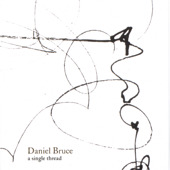 (NohJoh Music)
(NohJoh Music)
Guitarist Daniel Bruce received his Master's from North Texas State before relocating to the Chicago area. His debut album - A Single Thread was released in 2007, but a copy only recently made it's way into my hands - and I am glad that it did. Bruce is a busy teacher and player in the Chicago area - and can often be found performing with his trio or accompanying one of the fine female singers the area has to offer. On "A Single Thread," he is joined by several talented North Texas alum on a surprisingly self-assured recording. The excellent opening title track gives Bruce a chance to showcase his solo skills - revealing a technique that recalls Metheny, Abercrombie and more. Although Bruce primarily plays electric with only a touch of tasteful effects at times, he does also play nylon-string guitar on the lovely "Autumn." Many of the songs exhibit a similar airiness and sense of pacing - so the rollicking "A.M." comes as welcome high-energy number mid-way through the recording, complete with fine drum solo by Ross Pederson. Pianist Matt Lawless, bassist Scott Trayer, tenor saxophonist Brian Donohoe and trumpet player Ken Edwards all add pleasing work to the album - the latter's flugelhorn enhances "Etranger" - where Bruce himself appears on lap-steel guitar. And "Whisper" ends things with a bang and a whisper. A pleasant surprise and a strong release as well as debut recording - I hope to hear more from this talented young guitarist.
http://www.danielbrucemusic.com
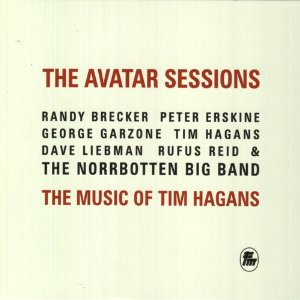 The Avatar Sessions - The Music of Tim Hagans
The Avatar Sessions - The Music of Tim Hagans
(Fuzzy Music)
Trumpeter Tim Hagans and drummer Peter Esrkine and the Norrbotten (Sweden) Big Band's last release - Worth the Wait was one of our favorites (see our review here and the boys are back with a brand new album of exciting Hagans-penned big band composition. This time they have upped the ante with the addition of several guest stars - occluding tenor saxophonist George Garzone, trumpeter Randy Brecker, soprano saxophonist Dave Liebman, bassist Rufus Reid and guitarist Vic Juris(on one track). The Norrbotten Big Band is known throughout Europe as one of the more adventurous ensembles on the current scene.
Hagans - who is well-known for his work with Marc Copland, Maria Schneider, Joe Lovano, the Yellowjackets and many more - and has also been the Artistic Director for the Norrbotten Big Band since 1996. His unique and exciting compositional style is enhanced by his understanding of the band's strengths - and the leader puts his band through their paces. Starting with the energetic "Buckeyes" through to the ending "Song for Mirka," Hagans shows himself to be a first rate composer for big bands who combines traditional understanding with new directions. The funky "Boo" is a highlight - with great trumpet work from Brecker and Hagans, while the "simple" love song""Box of Cannoli is anything but. The shimmering "Here With Me" features Liebman and is another highlight, as is "Palt Seanuts" - which harkens back to the early days of bebop. Reid gets the solo spotlight on "Rufus at Gilly's," flugelhornist Dan Johansson is showcased on the haunting "Song for Mirka," while drummer Erskine gets a couple solo spots that again remind what a great big band drummer he is. But it is the compositions that in the end are the biggest stars of this fine album of original big band music.
www.fuzzymusic.com
Chelsea Barartz - "In Faith"
 Saxophonist Chelsea Baratz takes her listeners into an urban groove setting with music and it is a pleasure hearing this talented young lady's hip musical direction.A musical disciple of Sean Jones and Branford Marsalis, Baratz is also an associate of young stars like trumpeters Corey Wilkes and Maurice "Mobetta" Brown and bassist extraordinaire Richie Goods - all of whom appear at times on her debut In Faith. "Philo's Groove" starts things off with a surprisingly tough-minded groove and is heightened by some fine sax, Craig Handy on flute, Wilkes' muted trumpet, Goods rubbery bass and Renee Neufville's vocals. The "Mobetta Remix" of the title track is a clear single - with Brown on muted trumpet, fellow Soul'd U Out keyboardist Chris Rob on moog synth and Raymond Angry on tasty Fender Rhodes. The lovely "Sentiments of Solitude" is a more straight-ahead jazz ballad with impressive work from Baratz and pianist Orrin Evans on this surprisingly mature and sensuous composition that has the ability to get under your skin. Baratz has grown immensely as a player since her work on Corey Wilkes' Drop It (see our review here) - her tasteful solo here may be her finest yet. "601" meanwhile, brings back the funk with Goods, Wilkes, drummer Jevon Rushton and electric pianist Mike Murray laying down a bouncy groove for Baratz to show some burning chops - this young player has obviously been working hard.
Saxophonist Chelsea Baratz takes her listeners into an urban groove setting with music and it is a pleasure hearing this talented young lady's hip musical direction.A musical disciple of Sean Jones and Branford Marsalis, Baratz is also an associate of young stars like trumpeters Corey Wilkes and Maurice "Mobetta" Brown and bassist extraordinaire Richie Goods - all of whom appear at times on her debut In Faith. "Philo's Groove" starts things off with a surprisingly tough-minded groove and is heightened by some fine sax, Craig Handy on flute, Wilkes' muted trumpet, Goods rubbery bass and Renee Neufville's vocals. The "Mobetta Remix" of the title track is a clear single - with Brown on muted trumpet, fellow Soul'd U Out keyboardist Chris Rob on moog synth and Raymond Angry on tasty Fender Rhodes. The lovely "Sentiments of Solitude" is a more straight-ahead jazz ballad with impressive work from Baratz and pianist Orrin Evans on this surprisingly mature and sensuous composition that has the ability to get under your skin. Baratz has grown immensely as a player since her work on Corey Wilkes' Drop It (see our review here) - her tasteful solo here may be her finest yet. "601" meanwhile, brings back the funk with Goods, Wilkes, drummer Jevon Rushton and electric pianist Mike Murray laying down a bouncy groove for Baratz to show some burning chops - this young player has obviously been working hard.
The young saxophonist slows it down for a couple more ballads, including Sean Jones' "Lover's Lullaby" and shows a nice touch with such material. Obed Calvaire's drum solo on the latter is a treat. The full In Faith is the centerpiece of the album, and offers more of the great band interplay on this number. "'Burgh Holla!" (a shout out to her original hometown) is a good-time high-stepping blues, while Fela Kuti's "Water No Get Enemy" ends the album with Baratz, Miller, Rushton and Goods, Brown and Rob (also on multi-tracked vocals) threatening to burn the place down on this high-energy afrobeat number. Keep the faith, sister - you are on the right track!
http://jazzburgher.ning.com/profile/ChelseaBaratz
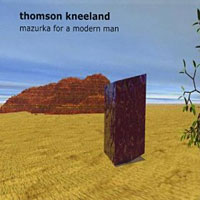 Thomson Kneeland - "Mazurka for a Modern Man"
Thomson Kneeland - "Mazurka for a Modern Man"
(Weltschmerz Records)
A tribute to Kneeland's friend and drummer/percussionist on this recording - Take Toriyama - who - battling depression - sadly took his own life two weeks after this album was recorded in 2007 - acoustic bassist Thomson Kneeland's Mazurka for a Modern Man combines a wide range of musical styles - with a primarily Eastern European influence in its all-original compositions and is performed by a group of young up-and-coming musicians in the NYC area who had been performing together already for a decade by the time of this recording. Saxophonist Loren Stillman - who has been winning considerable acclaim lately appears on roughly half the numbers, while guitarist Nate Radley also has been appearing al over the place is a fixture on most of the album. Trumpeter David Smith and Kneeland himself have both done considerable work as sidemen with people like Jon Gordon, Kenny Werner and Paul Bollenback.
Kneeland's interest in Balkan folk music, Indian Karnatic music and classical counterpoint infuses his music with a vibrant colors and energy and intricate rhythmic patterns. Opening number, "Ashlayah" is a perfect example and showcases the late Toriyama's abundant energy and creativity well. Radley and Stillman add some appropriately twisty Harmonic minor licks over the undulating Toriyama. "Hyperion" features Smith's soaring trumpet, Radley's depths of-the-ocean guitar and some impressive bass work from Kneeland. The triple meter of the title track allows Toriyama to shine, and Radley's guitar tone and chord voicing are intriguing. Kneeland's study of counterpoint appears in the lines Stillman and Smith play on the Middle-Eastern "Dithramb," while "Moja Tesknota" (My sad little girl) is Balkan chamber music with accordion. "Libretto"'s a catchy drum and bass rhythm takes things in an almost rock direction, while the indicate rhythms of "Nebuchadnezzar" (in 5, 7 and 11/8) keep the listener nicely off-balance. "Rhapsody (For Take Toriyama)" is lovely and a fitting reminder of a friend and fellow sensitive soul, and the album ends with the powerful "Crus Bifurcatus" with inspired playing by all. Both an excellent debut from a talented bassist and composer, as well as a heartfelt paean to a fellow musician who died far too young.
www.thomas kneeland.com
Nilson Matta's Brazilian Voyage - "Copacabana"
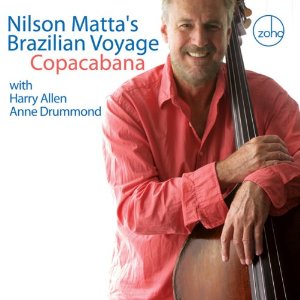 (Zoho)
(Zoho)
Brazilian bassist Nilson Matta relocated to New York City in 1985 and has been active in that city's Latin Jazz scene ever since, although he is perhaps not as well-known outside the community as he should be for his fine work with many of the stars of the genre. On his third release as a leader, he has assembled a top-notch band, including saxophonist Harry Allen, flautist Anne Drummond, pianist Klaus Mueller, drummer Maurico Zottarelli and percussionist Ze Maurico. The selections presented are five originals penned by Matta, one by Allen, and three famous Brazilian compositions: "Trenzinho do Caipra" by Heitor Villa-Lobos, the popular "Brazil (Aquarela do Brasil) by Ari Barroso and "Asa Branca/Baiao" by Gonzaga and Texeira. The quality of the compositions and high level of musicianship contribute to the authenticity that make this voyage a truly Brazilian one.
Matta's tribute to the legendary Brazilian guitarist Baden Powell de Aquino - "Baden" is a stunning opening number which showcases the powerhouse rhythm section of Matta, Zottarelli, Maurico and pianist Mueller on this upbeat thriller. Matta's playing and solo here is a jaw-dropping blend of technique and creativity, and Zottarelli also shines brightly on. The somewhat classical bend of this number is followed by a good-time flow of the Villa-Lobos number with Allen and Drummond joining the party. Allen - a long time associate of Matta, is especially well-suited to interpret this music, while his original ballad "I Can See Forever" brings a more North American and cosmopolitan (smoky NYC nightclub) straight-ahead element. Drummond, of course, sparkles as usual on the flute.
"Aquas Brasileras" slows things down delightfully into a quiet jungle of plucked bass and ambient percussion, before "Aquarela Do Basil" (Watercolors of Brazil) gets your feet moving again on this familiar tune that features some of Zottarelli's most inventive plinking of the keys. The folksy "Pantanal" spotlights Matta on solo arco bass to fine effect. Perhaps my favorite number is the bossa title track (not the Barry Manilow number) on which Matta doubles on nylon-string guitar and Allen breathily channels Stan Getz. Matta met his wife on Copacabana Beach and this tribute is suitably romantic. The shifting "Saci Perere" (a mythological trickster of the region) is another fun piece, with another stellar bass solo and great percussion, and "Asa Branca/Baiao" puts all of the elements together to leave the listener with a smile on his or her face. Zoho Music continues to release excellent music from south of the border and deserves kudos for yet another excellent and highly enjoyable release.
http://www.zohomusic.com
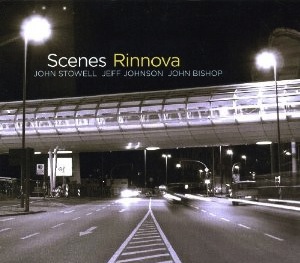 Scenes - "Rinnova"
Scenes - "Rinnova"
(Origin Records)
Interesting work here from a guitar trio who take the genre in some exciting new directions. Guitarist John Stowell, bassist Jeff Johnson and drummer John Bishop have been playing together for nearly a decade and have fashioned a sound that combines modern post bop with avant garde improvisational elements, strong playing and impressive group interaction. Stowell primarily sticks to electric guitar, but adds nylon string on "Leviathan" and a cover of Hemeto Pascoal's "Little Church," as well as an unusual fretless guitar on "Clues." Johnson is a powerhouse on acoustic bass and is equally at home on his electric bass. Bishop, meanwhile, is an equal member - filling the air with percussive sounds and maintaining the overall sense of time. Songs like "Chariots for Anthony," "Ambleside," "Behind the Scenes," "Art of Falling," "Fun With Fruit," "Virtual 52nd Street" and "Laughing River" will offer hours of listening enjoyment trying to untangle all the intricacies this groundbreaking trio engenders. Cool stuff.
www.origin-records.com
Check out all of our CD concerts reviews
Contact Brad Walseth and JazzChicago.net at bwalseth60@aol.com
Return to jazzchicago home
